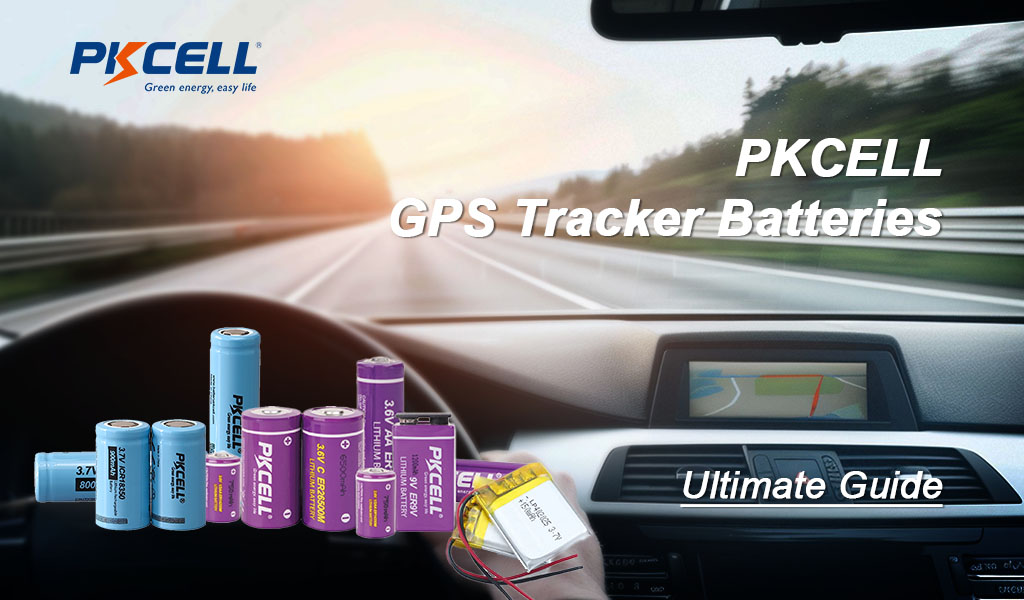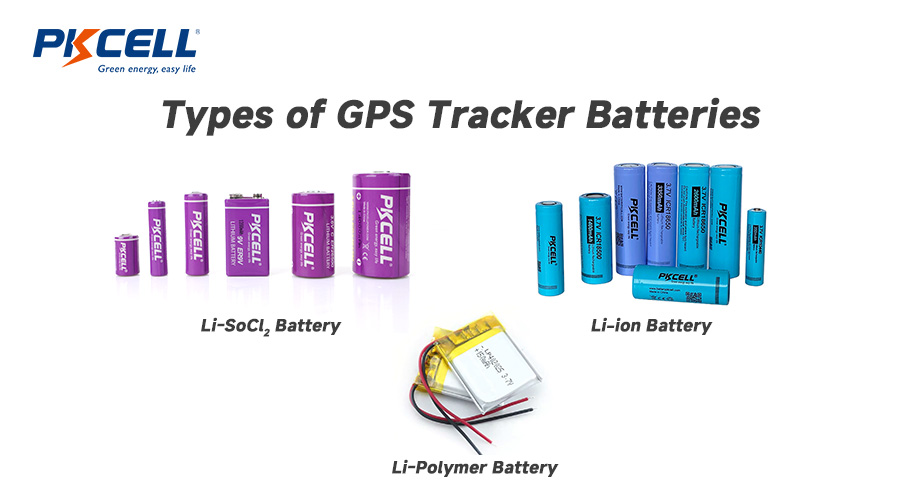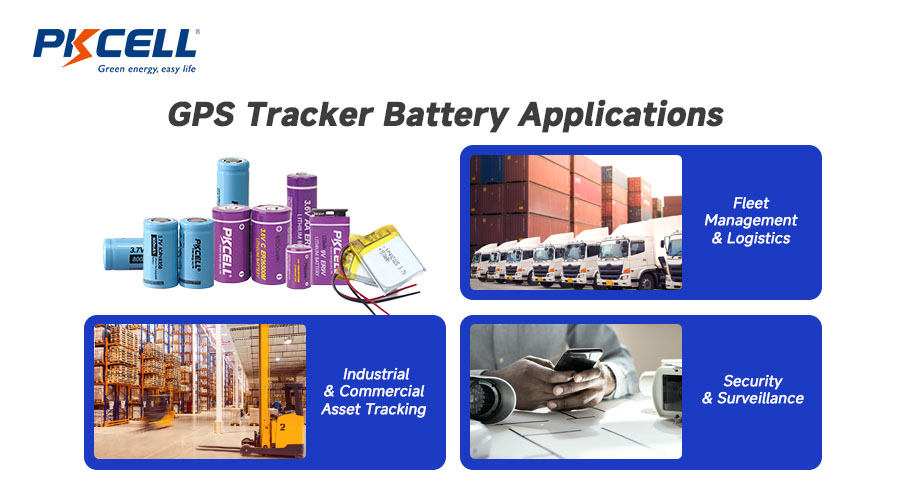Wichtige Highlights
- GPS-Tracker sind auf unterschiedliche Batterietypen angewiesen, um eine hervorragende Batterielebensdauer für eine unterbrechungsfreie Verfolgung zu gewährleisten.
- Zu den gängigen Batterietypen in Trackern gehören Lithium-Thionylchlorid, Lithium-Ionen und Lithium-Polymer.
- Faktoren wie mAh-Kapazität und Nutzungshäufigkeit bestimmen die lange Akkulaufzeit Ihres Geräts.
- GPS-Tracker werden häufig im Flottenmanagement, in der Anlagenüberwachung und in Sicherheitsanwendungen eingesetzt, die auf IoT-Technologien basieren.
- Durch ordnungsgemäße Wartung können Sie die Lebensdauer und Zuverlässigkeit der Batterie Ihres GPS-Trackers erheblich verlängern.
Einführung: Was ist eine GPS-Tracker-Batterie?
Der Akku eines GPS-Trackers versorgt das Ortungsgerät mit Strom. So funktioniert das Gerät wie gewünscht. Der Akku sorgt dafür, dass Ihr GPS-Tracker Standortaktualisierungen, Live-Benachrichtigungen und andere wichtige Informationen sendet.
Arten von GPS-Tracker-Batterien
Die Batterien, die Sie in einem GPS-Tracker finden, gibt es in verschiedenen Typen. Jeder hat seine Besonderheiten, die ihn für bestimmte Tracking-Anforderungen geeignet machen. Lithium-Thionylchlorid (Li-SOCl₂), Lithium-Ionen (Li-Ion) und Lithium-Polymer (Li-Po) sind die am häufigsten verwendeten Typen. Die Wahl der Batterie beeinflusst die Lebensdauer des Ortungsgeräts und seine Einsatzmöglichkeiten.
Lithiumthionylchlorid (Li-SOCl2)
Bekannt für ihre hohe Energie,Lithium-Thionylchlorid-Batterien (Li-SOCl2)werden oft für GPS-Tracker ausgewählt. Diese Batterien haben eine lange Haltbarkeit. Sie funktionieren auch bei extremen Temperaturen gut. Das macht sie gut für IoT-Anwendungen.
Eine typische Li-SOCl2-Batterie liefert 3,6 Volt und hat eine Kapazität von bis zu einigen tausend mAh. Das bedeutet, dass diese Batterien auch bei langen Tracking-Sitzungen eine konstante Leistung liefern. Außerdem verlieren sie bei Nichtgebrauch nur sehr wenig Energie, was die Batterielebensdauer verlängert und die optimale Funktion Ihres Tracking-Geräts gewährleistet.
Wenn Ihr Tracker lange mit Strom versorgt werden muss oder Ihr Ortungsgerät auch unter schwierigen Bedingungen funktionieren muss, sind diese Batterien eine gute Wahl. Sie können sich auf sie verlassen, egal ob es um GPS-Tracking, IoT-Aufgaben oder die Verwendung eines Trackers für andere Zwecke geht.
Lithium-Ionen (Li-Ionen)
Lithium-Ionen-Akkus (Li-Ion) sind bekannt für ihre hohe Energieleistung und lange Lebensdauer. Daher eignen sie sich gut für viele GPS-Tracker-Anwendungen. Mit diesen Akkus kann Ihr GPS-Tracker mit einer Ladung länger funktionieren. Die Akkulaufzeit kann mehrere Tage oder sogar Wochen betragen. Dank der fortschreitenden Technologie verfügen Li-Ion-Akkus über mehr Milliamperestunden (mAh). Dies trägt zu einem reibungslosen Betrieb Ihres GPS-Trackers, IoT-Geräts oder anderer Ortungsgeräte bei. Die Akkus sind leicht und einfach aufzuladen. Daher eignen sie sich hervorragend für Ortungsgeräte, bei denen die Geräte mobil oder robust sein müssen. Als wiederaufladbarer Akku sind sie zudem eine umweltfreundliche Option.
Lithium-Polymer (Li-Po)
Lithium-Polymer-Akkus (LiPo) erfreuen sich im GPS-Tracking großer Beliebtheit, da sie leicht sind und in vielen Formen hergestellt werden können. Hersteller können diese Tracking-Geräte daher in alle möglichen Gadgets integrieren und diese trotzdem schlank halten. LiPo-Akkus bieten eine lange Akkulaufzeit für Tracking- und GPS-Geräte. Sie speichern zudem viel Energie in einem kleinen Gehäuse und können daher lange Zeit ohne Aufladen verwendet werden. Mit der zunehmenden Verbreitung des IoT (Internet of Things) benötigen immer mehr Menschen diese Art von Akkus zum Auffinden und Verfolgen von Objekten. Daher steigt der Bedarf an längeren Akkulaufzeiten und höherer Leistung im GPS- und Tracking-Bereich stetig.
So wählen Sie die richtige GPS-Tracker-Batterie für Ihre Anwendung
Die Wahl des richtigen Akkus für Ihren GPS-Tracker hängt von Ihrem Einsatzzweck ab. Berücksichtigen Sie Aspekte wie Akkulaufzeit, mAh, Einsatzort und IoT-Funktionen. Wenn Sie etwas über einen längeren Zeitraum verfolgen müssen, sollten Sie sich Lithium-Thionylchlorid-Akkus ansehen. Diese halten länger als andere Typen. Für alle, die Akkus suchen, die wiederaufladbar und tragbar sind, sind Lithium-Ionen- und Lithium-Polymer-Akkus eine gute Wahl.
Hier ist ein kurzer Vergleich:
| Akku-Typ | Am besten für | Akkulaufzeit |
|---|---|---|
| Lithiumthionylchlorid | Langfristige Anlagenverfolgung Geringer Stromverbrauch Extreme Umgebungsbedingungen | Monate bis Jahre |
| Lithium-Ionen | Persönliche und tragbare Ortung Häufig verwendet | Tage bis Wochen |
| Lithium-Polymer | Kompakte und leichte Geräte Benötigen Sie eine kleine Größe und Flexibilität Hohe Stromaufnahme | Tage bis Wochen |
GPS-Tracker-Batterieanwendungen in verschiedenen Branchen
Flottenmanagement & Logistik
Flottenmanagement und Logistik sind auf GPS-Tracker angewiesen. Mit diesen Tracking-Tools können Sie in Echtzeit sehen, wo sich die Fahrzeuge befinden. Die Verwendung von GPS-Trackern mit langer Batterielebensdauer ist wichtig, da sie den Wartungsaufwand reduzieren. Daher sind langlebigeLi-SOCl2Batteriensind gute Optionen für Fahrzeugortungsgeräte und Anlagenüberwachungslösungen, die in abgelegenen oder temperaturempfindlichen Gebieten eingesetzt werden.
Verfolgung industrieller und kommerzieller Vermögenswerte
In vielen Fabriken und Unternehmen sorgen Ortungsgeräte für die Sicherheit wichtiger Gegenstände. Diese mit leistungsstarken Batterien betriebenen Ortungsgeräte werden beispielsweise in Lagerhallen, Arbeitsbereichen oder beim Versand von Gegenständen eingesetzt. Dies hilft, Verlust oder Diebstahl zu verhindern. Da diese Gegenstände an verschiedenen Orten und bei unterschiedlichem Wetter einwandfrei funktionieren müssen, sind robuste Ortungsgeräte mit langlebigen Batterien, wie z. B.Li-Ionen und LiSoCl2Batterien sorgen dafür, dass alles reibungslos funktioniert.
Sicherheit und Überwachung
Sicherheits- und Überwachungsteams nutzen GPS-Tracker, um die Sicherheit von Personen und Orten zu gewährleisten. Diese Tracker funktionieren gut, weil sie IoT-Technologie nutzen und über kompakte Batterien verfügen, wie z. B.Li-Po-AkkusGeräte mit GPS und leistungsstarken Akkus funktionieren auch dann, wenn Sie sie am meisten brauchen. Dank der kompakten Akkus sind die Tracker klein und leicht zu transportieren. So können Sie verhindern, dass Personen an Orte gelangen, an die sie nicht gehen sollten, oder den Standort von Personen in Gefahr verfolgen.
Maximierung der Akkulaufzeit des GPS-Trackers
Eine lange Akkulaufzeit ist für jeden GPS-Tracker sehr wichtig. Hier sind einige Schritte, um die Akkulaufzeit des GPS-Trackers zu maximieren:
- Sie können zunächst ändern, wie oft Ihr GPS-Tracker seine Position aktualisiert. Wenn Sie den Tracker so einstellen, dass er seltener Standortaktualisierungen sendet, sparen Sie Strom. Einige Tracker verfügen über einen Standby-Modus für den Fall, dass sie nicht verwendet werden. Nutzen Sie ihn, falls Ihr GPS-Tracker diesen hat.
- Deaktivieren Sie auch nicht benötigte Funktionen, wie z. B. ständige Signalaktualisierungen, sofern Sie diese nicht wirklich benötigen. Nutzen Sie nur das Nötigste und schonen Sie so den Akku.
- Überladen Sie den Akku Ihres Trackers nicht, wenn Sie ihn aufladen. Diese einfache Gewohnheit trägt dazu bei, dass der Akku länger hält.
- Wenn Sie eine sehr lange Reise vor sich haben, können Sie einen zusätzlichen Akku mitnehmen. Auf diese Weise kann Ihr Tracker länger laufen, ohne erneut aufgeladen werden zu müssen.
So pflegen Sie die Batterie Ihres GPS-Trackers
Durch die richtige Pflege Ihres GPS-Trackers hält die Batterie länger.
- Es ist ratsam, das Ortungsgerät regelmäßig auf etwaige Schäden zu überprüfen.
- Versuchen Sie, es vor Wasser oder rauem Wetter zu schützen.
- Bewahren Sie den Tracker und die Batterie an einem kühlen, trockenen Ort auf, damit sie lange Zeit einwandfrei funktionieren.
- Befolgen Sie die Hinweise zur Verwendung und zum Laden des Trackers. Lassen Sie den Akku nicht vollständig entladen, bevor Sie ihn aufladen.
- Es ist außerdem ratsam, das GPS- und Ortungsgerät mit der neuesten Software auf dem neuesten Stand zu halten. Diese Updates können dazu beitragen, dass die Batterie besser funktioniert.
Warum sollten Sie sich für die Batterie Ihres GPS-Trackers für PKCELL entscheiden?
PKCELLbietet Ihnen leistungsstarke Batterielösungen für GPS-Tracker. Unsere Batterien haben eine lange Lebensdauer und sind daher für die Ortung von Personen und Gegenständen im Unternehmen geeignet. Unsere Batterien sind für die Anforderungen kontinuierlicher Ortung ausgelegt und bieten Ihnen Sicherheit im gewerblichen Einsatz. Wir befolgen strenge Qualitätskontrollstandards und stellen sicher, dass jede Batterie internationale Zertifizierungen wie ISO 9001, CE und RoHS erfüllt. Ob Hersteller oder Händler – PKCELL bietet langlebige und kostengünstige GPS-Tracker-Batterien, auf die Sie sich verlassen können. Bei Fragen oder Unterstützung bei der Batterieauswahl können Sie eine kostenlose Beratung anfordern. Wir bieten wettbewerbsfähige Preise für Großbestellungen.Kontaktieren Sie uns jetzt!
Abschluss
Zusammenfassend lässt sich sagen, dass die Kenntnis der verschiedenen GPS-Tracker-Akkus und ihrer Funktionsweise wichtig ist, um das Beste aus Ihren Ortungsgeräten in jeder Branche herauszuholen. Die Wahl des richtigen GPS-Tracker-Akkus verlängert die Lebensdauer Ihres Trackers und verbessert die Funktion des Ortungssystems. Wenn Sie GPS für die Flottenortung, in der Industrie oder für Sicherheitsaufgaben nutzen, kann eine gute Pflege Ihres Geräts die Akkulaufzeit verlängern. Nutzen Sie unsere hier vorgestellten Tipps, um die beste Option für Ihre Bedürfnisse zu finden. Wenn Sie Ihr GPS-Tracking verbessern möchten, kontaktieren Sie uns jetzt und sprechen Sie mit einem unserer Mitarbeiter!
Häufig gestellte Fragen
Wie lange halten die Batterien eines GPS-Trackers normalerweise?
Die Akkulaufzeit eines GPS-Trackers ist nicht immer gleich. Standardbatterien in GPS-Trackern können zwischen zwei Wochen und sechs Monaten halten. Dies hängt hauptsächlich von der mAh-Zahl des Akkus und der Häufigkeit der Nutzung des Trackers ab. Einige GPS-Geräte mit langer Akkulaufzeit können etwa ein Jahr halten, wenn Sie sie auf Stromsparen einstellen.
Sind solarbetriebene GPS-Tracker eine gute Alternative?
Solarbetriebene GPS-Tracker sind eine gute Wahl, wenn Sie eine umweltfreundlichere Lösung suchen. Sie haben eine lange Akkulaufzeit. Die Tracker laden sich durch Sonneneinstrahlung auf, sodass der Akku nicht so schnell leer wird. Dadurch eignen sie sich gut für IoT-Geräte im Freien, in abgelegenen Gebieten oder an schwer erreichbaren Orten.
Welche Sicherheitsvorkehrungen sollte ich bei GPS-Tracker-Batterien treffen?
Verwenden Sie immer das passende Ladegerät für Ihren GPS-Tracker. So vermeiden Sie Schäden am Akku. Bewahren Sie den Tracker an einem kühlen, trockenen Ort auf. So wird er nicht zu heiß. Überprüfen Sie Ihr GPS regelmäßig auf Verschleißerscheinungen oder Probleme. So bleibt es sicher und funktioniert jederzeit einwandfrei. Wenn Sie das Gerät nicht überladen, verlängert sich die Akkulaufzeit. Pflegen Sie Ihr GPS und den Akku stets, um das Beste aus beiden herauszuholen.
Beitragszeit: 27. Juni 2025








